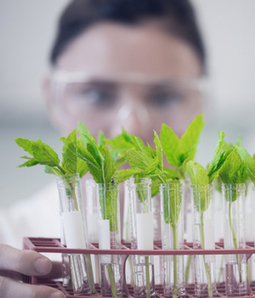Anti-GM activists will never accept anything ‘unnatural’, but the genetically modified potato being developed in Norwich could be of tremendous benefitThe last great famine in western Europe struck Ireland 170 years ago.
The last great famine in western Europe struck Ireland 170 years ago. Writing to their parents on 6 September 1846, Michael and Mary Rush described the situation: “The scourge of God fell down on Ireland, in taking away the potatoes, they being the only support of the people. So, dear father and mother, if you don’t endeavour to take us out of it, it will be the first news you will hear by some friend of me and my little family to be lost by hunger; and there thousands dread they will share the same fate.”
In fact, the immediate cause of the disaster was not a “scourge of God” but the attack of an entirely natural pest, a fungus called Phytophthora infestans whose spores had in 1845 hitched a ride across the Atlantic on a shipment of seed potatoes. Within a few years, about 1 million Irish people starved and about 2 million fled the country. The disease can now be controlled by spraying crops with fungicides; but new and aggressive strains have emerged and chemical control is estimated to cost €15m (£11m) in Ireland alone. Even with spraying, blight causes yield losses worldwide estimated to be worth about £3bn annually.
But there may be an answer. British scientists working at the government-supported Sainsbury laboratory in Norwich are planning to develop a new variety of super-spud that can resist blight and other diseases and may even be better for us. The research is headed by Professor Jonathan Jones, who was a member of the team that sequenced the Irish potato blight fungus in 2009.
Jones aims to make a GM potato with a blight resistance gene from a wild South American potato called Solanum venturii, plus two more resistance genes so that the fungus can’t itself develop resistance. He also aims to add genes that will protect potatoes against nematode worms, another big problem in potato cultivation. The GM potatoes may also be genetically modified to protect against bruising and to lower the risk of producing toxic chemicals when fried in chip fat.
There's no choice: we must grow GM crops nowObserver editorial: Almost a billion people face starvation and that problem will worsen unless we use the most effective technologies Read more
Of course, GM potatoes are not entirely natural. If you want natural potatoes try the rotten, stinking and poisonous variety produced by infestation of the entirely natural Phytophthora infestans. The great plague was entirely natural, as were the cholera epidemics of 19th-century Europe, as are Aids, malaria or Ebola today. All of these have contributed to the process of population control that Thomas Malthus promoted when, in 1817, he wrote: “The land in Ireland is infinitely more peopled than in England; and to give full effect to the natural resources of the country, a great part of the population should be swept from the soil.” Potato blight did precisely as Malthus demanded 170 years ago and the consequent human suffering was devastating.
Advertisement
Malthus believed that the only way to feed everyone was to reduce the number of hungry mouths. Modern science, medicine and technology have proved him wrong. Modern varieties of potato are already the product of plant breeding, and with GM technologies, the future of potato cultivation could be even brighter.
But only if GM crops are allowed to be grown. The anti-GM lobby continues to campaign for banning GM crops, and activists insist on stomping all over any trial plots. Researchers in the Centre of Life and Food Sciences in Germany and the University of California recently estimated that opposition to the introduction of vitamin A-rich GM “golden rice” – which was designed to prevent blindness and immune deficiency in children – has cost about 1.4 million life-years (years of life and quality of life lost) over the past decade in India alone.
I suspect GM potatoes will not see the light of day on lands owned by the Duchy of Cornwall. But the ancestors of the Prince of Wales didn’t help much in the Irish famine 170 years ago either. If we are to prevent future generations from going hungry, we need to embrace GM technology.
Via
Christophe Jacquet
 Your new post is loading...
Your new post is loading...
 Your new post is loading...
Your new post is loading...


















